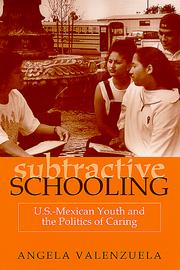| Listing 1 - 2 of 2 |
Sort by
|

ISBN: 0585281009 9780585281001 0791443213 0791443221 9780791443217 9780791443224 0791443213 9780791443217 9781438443224 1438422628 9781438422626 Year: 1999 Publisher: Albany, N.Y. State University of New York Press
Abstract | Keywords | Export | Availability | Bookmark
 Loading...
Loading...Choose an application
- Reference Manager
- EndNote
- RefWorks (Direct export to RefWorks)
"Subtractive Schooling provides a framework for understanding the patterns of immigrant achievement and U.S.-born underachievement frequently noted in the literature and observed by the author in her ethnographic account of regular-track youth attending a comprehensive, virtually all-Mexican, inner-city high school in Houston. Valenzuela argues that schools subtract resources from youth in two major ways: firstly by dismissing their definition of education and secondly through assimilationist policies and practices that minimize their culture and language. A key consequence is the erosion of students' social capital evident in the absence of academically oriented networks among acculturated, U.S.-born youth."--Jacket.
Mexican Americans --- Children of immigrants --- Mexican American youth --- Hijos de inmigrantes --- Juventud mexicano americana --- Provision of education. --- Educational policy. --- Youth. --- Mexicans. --- Youth, Mexican American --- Youth --- First generation children --- Immigrants' children --- Second generation children --- Immigrants --- Chicanos --- Hispanos --- Ethnology --- Education (Secondary) --- Social conditions --- Educación secundaria --- Condiciones sociales
Book
Year: 2002 Publisher: Washington, D.C., The World Bank,
Abstract | Keywords | Export | Availability | Bookmark
 Loading...
Loading...Choose an application
- Reference Manager
- EndNote
- RefWorks (Direct export to RefWorks)
Under some conditions, macroeconomic crises can have a positive effect on the accumulation of human capital because they reduce the opportunity cost of schooling. This has profound implications for the design of appropriate social protection policies. The impact of macroeconomic crises on parents' investments in the human capital of their children is a widely contested issue. Schady analyzes the effects of the profound macroeconomic crisis in Peru in 1988-92 on the schooling and employment decisions made by urban school-age children. He arrives at two basic findings: First, the crisis had no effect on the attendance rates of school-age children. But the share of children who were both employed and in school fell significantly during the crisis; Second, mean educational attainment was significantly higher for children who were exposed to the crisis than for those who were not. Schady argues that these findings may be related: children who are not employed have more time available and may therefore put more effort into school. He concludes with a discussion of the implications of his findings for the design of appropriate social protection policies. This paper-a product of the Poverty Sector Unit, Latin America and the Caribbean Region-is part of a larger effort in the region to understand the effects of macroeconomic crises on households, and to design appropriate policies to mitigate their costs.
Adults --- Attendance Rate --- Attendance Rates --- Disability --- Education --- Education for All --- Education of Parents --- Educational Attainment --- Effective Schools and Teachers --- Enrollment Rates --- Enrolment Rates --- Finance and Financial Sector Development --- Financial Literacy --- Health, Nutrition and Population --- Investments In Education --- Labor Policies --- Parental Education --- Population Policies --- Primary Education --- Primary School --- Provision Of Education --- Public Expenditures On Education --- Public School --- School --- School Attendance --- School Enrollment --- School Year --- Schooling --- Secondary School --- Social Protections and Labor --- Street Children --- Tertiary Education --- Urban Development --- Youth and Government
| Listing 1 - 2 of 2 |
Sort by
|

 Search
Search Feedback
Feedback About UniCat
About UniCat  Help
Help News
News